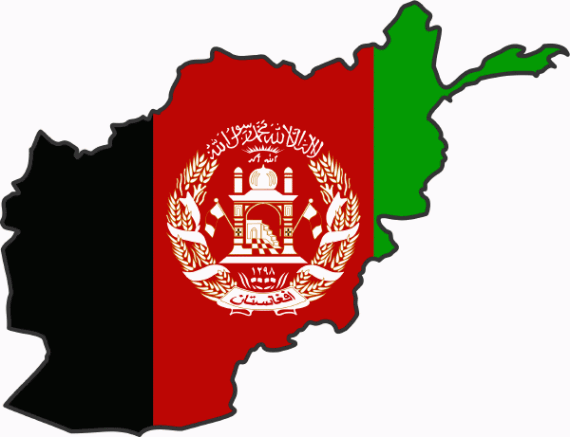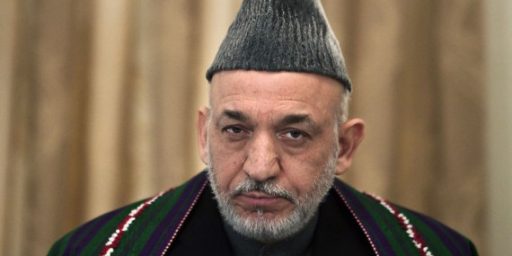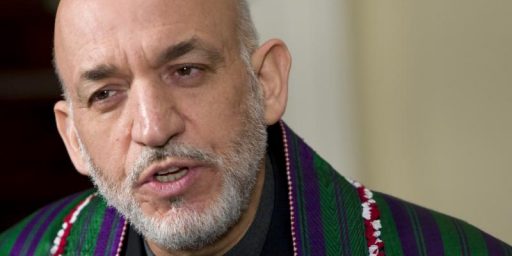Karzai Corruption Includes Iranian Bribes
We already knew that Hamid Karzai was corrupt, now we know he takes bribes from the Iranians.
Corruption in the government of Afghan President Hamid Karzai has been a head for U.S. policy makers for years, now it appears to extend to receipt of bribes from the Islamic Republic of Iran:
One evening last August, as President Hamid Karzai wrapped up an official visit to Iran, his personal plane sat on the airport tarmac, waiting for a late-running passenger: Iran’s ambassador to Afghanistan.
The ambassador, Feda Hussein Maliki, finally appeared, taking a seat next to Umar Daudzai, Mr. Karzai’s chief of staff and his most trusted confidant. According to an Afghan official on the plane, Mr. Maliki handed Mr. Daudzai a large plastic bag bulging with packets of euro bills. A second Afghan official confirmed that Mr. Daudzai carried home a large bag of cash.
“This is the Iranian money,” said an Afghan official, who spoke on condition of anonymity. “Many of us noticed this.”
The bag of money is part of a secret, steady stream of Iranian cash intended to buy the loyalty of Mr. Daudzai and promote Iran’s interests in the presidential palace, according to Afghan and Western officials here. Iran uses its influence to help drive a wedge between the Afghans and their American and NATO benefactors, they say.
The payments, which officials say total millions of dollars, form an off-the-books fund that Mr. Daudzai and Mr. Karzai have used to pay Afghan lawmakers, tribal elders and even Taliban commanders to secure their loyalty, the officials said.
“It’s basically a presidential slush fund,” a Western official in Kabul said of the Iranian-supplied money. “Daudzai’s mission is to advance Iranian interests.
And the influence that the Iranians are purchasing could have lethal effects for Afghan opponents of the Karzai government and U.S. troops:
The payments to Mr. Daudzai illustrate the degree to which the Iranian government has penetrated Mr. Karzai’s inner circle despite his presumed alliance with the United States and the other NATO countries, which have sustained him with military forces and billions of dollars since the Taliban’s ouster since 2001.
Earlier this year, Mr. Karzai invited the Iranian president, Mahmoud Ahmadinejad, to the presidential palace, where Mr. Ahmadinejad gave a virulently anti-American speech. When Mr. Ahmadinejad visited Kabul, he brought two boxes of cash, an Afghan official said. “One box was for Daudzai personally, the other for the palace,” the official said.
A senior NATO officer, speaking on condition of anonymity, declined to discuss whether Mr. Daudzai was receiving money from Iran. But he said that the Iranian government was conducting an aggressive campaign inside Afghanistan to undermine the American and NATO mission and to gain influence in politics.
The NATO officer said Iran’s intelligence agencies were playing both sides of the conflict, providing financing, weapons and training to the Taliban. Iranian agents also financed the campaigns of several Afghans who ran in last month’s parliamentary election, the NATO officer said.
The Iranian intelligence services have developed the ability to assassinate opponents and attack American troops inside the country, the NATO officer said.
“I am very concerned that they have a lethal capability and presence inside Afghanistan and Kabul,” the officer said.
Obama administration officials have expressed alarm about Iranian intentions. Last week, Richard C. Holbrooke, the administration’s special representative to Afghanistan and Pakistan, complained to Afghanistan’s finance minister, Hazrat Omar Zakhilwal, about Mr. Daudzai and Iran’s influence in the presidential palace, a former Afghan official said.
Mr. Holbrooke did not respond to requests for comment. In an interview, Mr. Zakhilwal declined to talk about the discussion with Mr. Holbrooke or about any Iranian activities in Afghanistan.
“We have no choice but to be friendly with Iran,” Mr. Zakhilwal said. “It’s a hostile neighborhood.”
On some level, Karzai’s decision to cozy up to Iran makes sense. After all, he knows that the United States is isn’t going to be in Afghanistan forever, and even that his own record of electoral and personal corruption will at some point cause the U.S. to realize that defending an inherently corrupt regime that makes a farce out of the democratic process just isn’t worth it. For a nation with borders that touches some of the most powerful nations in Western Asia, it’s not surprising that he’d cozy up to Iran as a way of protecting his own power, which is ultimately all that Hamid Karzai appears to care about.
The question for the U.S., though, is how long we’re going to maintain the charade that Hamid Karzai is an honest partner, or in any sense an ally of convenience only. We’ve adopted a war strategy that depends on winning the hearts and minds of the Afghan people, and at the same time we’re backing a leader that his corrupt and has turned their elections into a fraud. In a society where tribal loyalties are still stronger than any sense of nationalism, that seems like a combination that’s doomed to failure in the end.







Fits nicely with all the stories about money leaving the country to go into safe foreign accounts for Karzai. Something about avoiding a street lamp in the future.
This also ties in with the shift to a more kinetic approach by Petraeus. He could work with Maliki, who was also corrupt, but Karzai is worse and has nothing to offer in return. On the Iran side, this looks more like setting up for influence post-war. If they really wanted to hurt us now, they would train and arm more snipers methinks. To the best of my knowledge, the Taliban are still mostly using AKs, Enfields and Mosin-Nagants.
Steve
Its kind of strange to see people criticizing Karzai as being “corrupt” fro accepting large amounts of cash from a foreign government, given that we have been pumping large amounts of cash to him and his government for a decade now. How exactly is what Iran doing so different than we are doing with him?
In fact, spreading around dollars, physical stacks of dollar bills, largely unaccounted for, has been a central feature of our strategy in Afghanistan since around 9/12/01. Oh, but when others do it, suddenly its “corruption”?
Were doling out bribes on a mega scale in Afghanistan to Karzai and his circle so why should be shocked the Iranians are also doing it? Are our bribes supposed to be good clean American bribes? We are so stupid at times as even a cursory examination of the Iraq Wikileaks surely demonstrates and now we’re repeating the trick in Afghanistan. There are NO honest partners in Afghanistan any more than dropping bombs on people is likely to prove particularly effective in winning their “hearts and minds.”
“After all, he knows that the United States is going to be in Afghanistan forever…”
@Mataconis: Did you mean to say “isn’t” there? The context makes me think you did, but I’m not entirely certain.
Yea that’s a fast-typing mistake that needs to be corrected….
Well, he may be a corrupt bastard, but he’s OUR corrupt bastard, as we used to say during the Cold War.
DC Loser,
I suggest you Google this name: Ngo Dinh Diem
He was “our bastard” too
@Doug – We had more than one of those. So was Samoza, Duvalier, etc…..
We weren’t fighting wars in those countries, though. At least not directly
I use the Cold War analogy because even though we were not directly involved in many of the bush wars, we were involved in the ideological confrontation with the Soviets via proxies. That was the understanding we reached with the Soviets after the Cuban Missile Crisis in order to prevent a nuclear war. They used the Cubans and East Germans, and we had the Samozas and the Savimbis.
And how well did that really work?
Backing Somoza brought us the Sandinistas, backing the Shah brought us the mullahs, and backing tin-horn dictators did more to turn Africans sympathetic to the Soviets than any copy of The Communist Manifesto ever could have.
There are many things wrong with our policy in Afghanistan, in my opinion, and continuing to engage in a policy that depends largely on Karzai being an honest player is just foolish
I think we’re in violent agreement here. Obviously I didn’t turn my sarcasm mode on in the initial post. But then again, what are our only realistic options besides bugging out and leaving the Afghans to fight it out themselves and perhaps the Iranians and Pakistanis to fill the vacuum?
“…a policy that depends largely on Karzai being an honest player is just foolish”
What do you mean – dependent on Karzai being an honest player? Have we not always used “bribery” to win the loyalty of various factions, including Karzai? Do you really think that anyone assumes he is honest, in a Western sense of good governance? Do you really think an “honest” politician would survive five minutes there?
What kind of a relationship do you imagine he will forge with Iran – a large and influential country that sits on his western border – and will always be there? Do you think he really has much of a choice but to find some accomodation?
I think you are operating from some sort of a strawman position – that the US administration is under some illusion that we are in the midst of creating Switzerland in the Hindu Kush. Moving beyond corruption is a very long process – one that we are far from seeing through to its end even here in the United States. Afghanistan is still in the baby-steps stage of democratization, and I kinda suspect that everyone involved with Afghan policy understands that very well.
Except when violence is front and center, it is money that is the constant vehicle through which power is exercised. Containing, controlling, and regularizing the flow of money in politics, so that it reflects the values of a modern democratic society is a long difficult process. Evidence that the process is not complete is hardly a reason to abandon the process. Even here in the US, every time there is a regulation passed that effects the power-money axis, there is an instant effort by those with money, to find a way around the regulation. That is human nature, and we see it operating in a much more raw manner in Afghanistan – but that is to be expected.
Yes, Karzai is corrupt. So are half the Republicans and even a few Democrats here in the US. 🙂
I think you need to build a deeper argument than this against our Afghanistan policy.
“There are many things wrong with our policy in Afghanistan, in my opinion, and continuing to engage in a policy that depends largely on Karzai being an honest player is just foolish”
But the people who enjoy war or make a buck off it realize once America pulls out of Afghanistan we’re not going back in.
So, pulling out, coming up with a new plan, then going back in is not an option.
We may be losing Afghanistan in out tenth year fighting there but the money we’re dishing out there has tripled in the last year or so….a big win for some.
Afghanistan: is it too early to call for regime change (again)?
For that matter, what are the Iranians supposed to do? Put yourself in their shoes. A large, unstable neighbor serves as a playing field for competition by a number of regional and global powers, including your polticial and economic adversaries. It would irresponsible for Iran’s leaders not to try to influence the course of events in Afghanistan.
Which raises another point: If you’re tempted to see Karzai as weak and not worth supporting, ask yourself why the Iranians are handing him sacks of cash.